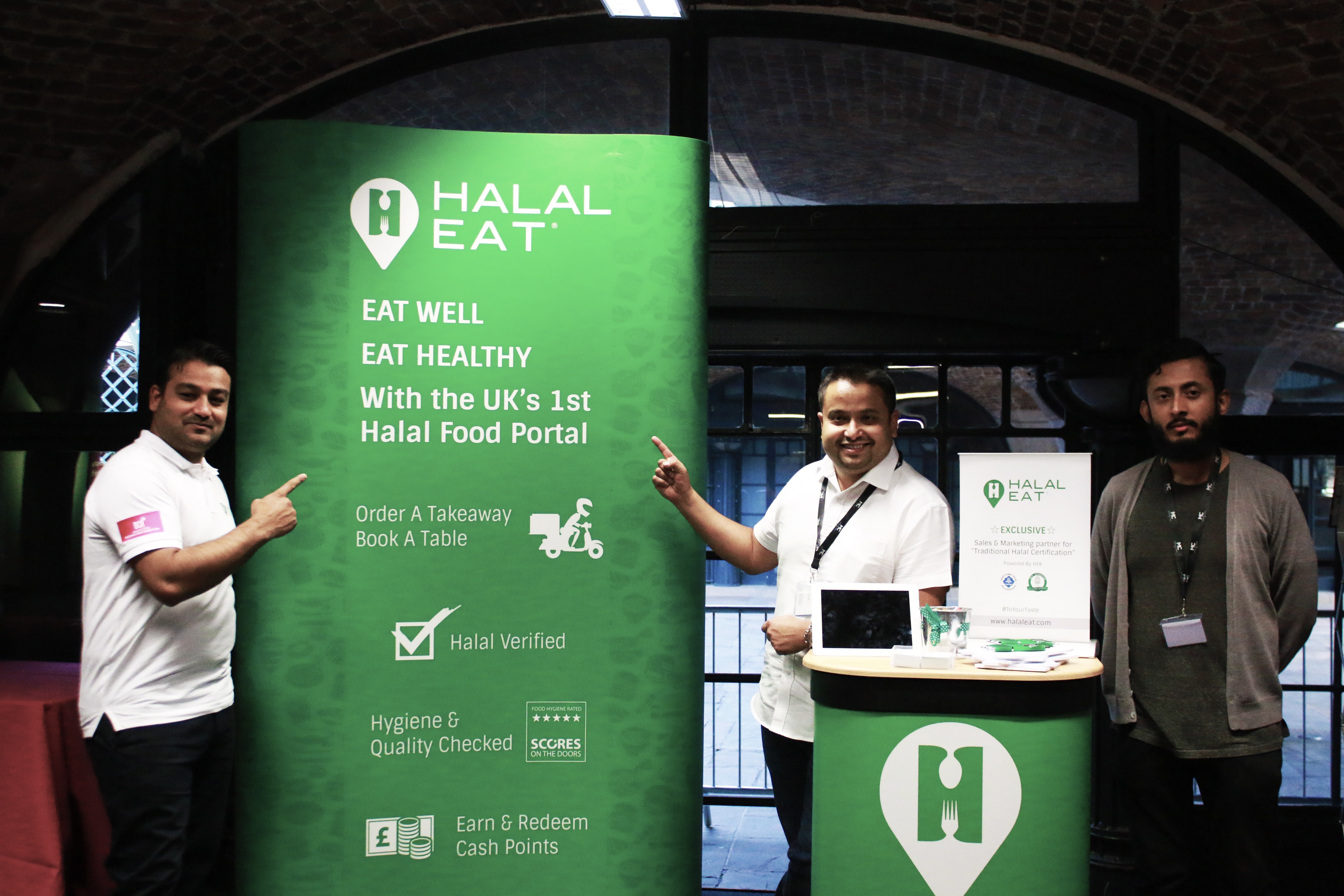EXCLUSIVE-UK start-up HalalEat turns down 104,314 pound crowdfund for sole investor
Photo: L-R - HalalEat founder and CEO Abul Rob, sales manager Ali Hassan, and co-founder Musa Ahmed. Courtesy HalalEat
UK start-up HalalEat has turned down the 104,314 British pounds ($140,225) it crowdfunded from around 160 investors to go with a single investor whose contacts will give it a ‘more assured’ international expansion into the United States, founder and CEO Abul Rob told Salaam Gateway.
Pakistani investor Mian Ali, who is founder and chairman of Lahore-based outsourcing company TransData, is backing UK’s first on demand halal takeaway platform with “substantially more†than what the start-up raised on crowdfunder Seedrs, said Rob, declining to reveal the exact investment amount.
“We’ve got access to the money through him, as in the same amount [that we raised on Seedrs], if not more if we need further liquidity and to grow the business,†Rob said.
Ali’s equity stake is in “similar consideration†to the 7 percent that was offered to investors on Seedrs, said Rob.
“His biggest interest is for us to enter the U.S. as quickly as possible because he himself has seen the growth of the Muslim population in the country, particularly in New York,†Rob added.
He said HalalEat will be in New York by the end of 2018.
“There is still a lot of work to do but our first international entry will definitely be the U.S., starting with New York, that’s where we see the strongest enquiries coming in,†said Rob.
FAMILIAR BUSINESS
Rob refers to Ali as both an investor and a partner because of his familiarity with HalalEat’s business model.
Ali’s outsourcing company used to manage the call centre operations for UK’s HungryHouse before the online food ordering platform was bought by German company Delivery Hero in 2011.
In November this year, Delivery Hero got the green light from UK’s Competition and Markets Authority to sell HungryHouse to British rival Just Eat for 240 million pounds.
“Mian had already seen the success of on-demand food portals so he could see the dynamics of where this business is going,†said Rob.
Ali is also familiar with doing business in the United States as his outsourcing company has a corporate office in New Jersey.
According to his LinkedIn page, Ali is currently VP, global strategy and operations, for EventCart, a Finland-based all-in-one event management platform and an investor in U.S.-based Kylie.ai, an artificial intelligence start-up that clones employee personalities to automate conversations between a company and its customers.
Ali could not be reached for comment.
U.S. TWEAKS
In the UK, HalalEat works closely with organisations such as certifier Halal Food Authority. It will adopt a similar process with relevant U.S.-based institutions, said Rob.
“We do have to tweak a little bit according to the local needs of the market in terms of what the consumer desires and what the consumer understanding of what halal is, but we’re going to ensure that the same protocol exists as in the UK where we will not take a menu with possible cross-contamination issues,†added Rob.
GROWTH
HalalEat has abandoned its earlier plans of expanding its nation-wide footprint and made a strategic decision to focus only on London.
“We’ve now switched off all the restaurants that we had outside of London and our commercial focus is solely on London,†said Rob.
“What we’ve found is that with fewer restaurants we are getting more customers and more orders, purely because our commercial focus is now completely 100 percent on London, whereas before, business was growing but we were spread too thin,†said Rob.
According to him, delivery orders processed on HalalEat grew around 145 percent in November from the previous month, and 1,365 percent year-on-year, as the company focused on customer acquisition, which has largely been extending discounts of up to 50 percent on first orders by new customers.
“What we’re seeing is that even after bringing those customers on board at a steep discount, customer loyalty is really strong, as in they’re coming back to repurchase within less than a week,†said Rob.
HalalEat’s average customer orders twice a month and the average basket size is around 30 pounds ($40), said Rob.
He also attributes the growth to a general increase in demand for halal food in the UK.
Last month, online food delivery company Deliveroo, which announced in September it had raised $385 million in private funding, sent an email to partner restaurants saying that it was “updating all the tagging†on menus. The email, seen by Salaam Gateway, said, “There is a fast-growing number of people searching for halal on Deliveroo, and orders are increasing month on month.â€
Rob said he is confident that HalalEat’s process management and commercial focus will enable it to compete with a company the size of Deliveroo.
“Some people say – ‘they’re going to kill your business model’. They can’t. They’re just putting the definition of halal in one singular tick box,†said Rob.
“What we’ve done is, we’ve made halal to that individual requirement where you can have it certified or not certified, you can go to a restaurant where there’s alcohol and still have halal food but not consume the alcohol,†he added.
“The difference between the big players and us is that individual fact-checking more than anything else. We actually try the product before it goes into the website.â€
($1 = 0.7439 British pounds)
(Reporting by Emmy Abdul Alim; Editing by Seban Scaria)
© SalaamGateway.com 2017 All Rights Reserved
